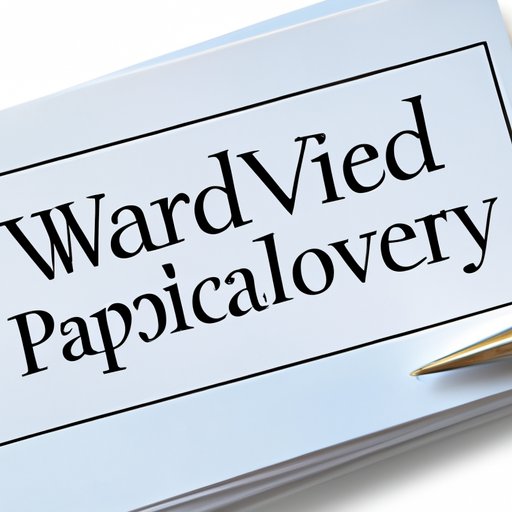
I. Introduction
Paying for nursing home care can be a big challenge for families that are already struggling financially. With the high cost of long-term care, it’s not uncommon for seniors and their families to run out of money quickly. So, what can you do if you need nursing home care but have no money to pay for it? In this article, we’ll explore different options for paying for nursing home care when finances are limited.
II. Exploring Medicaid coverage for nursing home care
Medicaid is a government program that provides health coverage for millions of Americans. In most states, Medicaid also pays for nursing home care for seniors who meet certain eligibility requirements. To be eligible for Medicaid coverage of nursing home care, you must have limited income and assets and meet other criteria. You’ll need to fill out an application and go through a review process to determine if you are eligible.
If you’re considering Medicaid for nursing home care, it’s best to start the process early so that you have enough time to gather all the necessary documentation. It can be a complicated process, so it’s a good idea to seek help from a qualified professional who can guide you through the application process.
III. Selling assets to pay for nursing home care
If you or a loved one has assets that can be sold, this can be a way to cover the cost of nursing home care. Some assets that could be sold include a family home, a second car, or stocks and bonds.
It’s important to find buyers who can pay fair prices for your assets. This can involve working with real estate agents, financial advisors or stock brokers to help you liquidate your assets. It’s also a good idea to consult with an attorney to ensure that any sales are done in a way that is financially advantageous and legally compliant.
IV. Investigating veteran’s benefits for nursing home care
If you’re a veteran or the spouse of a veteran, you may be eligible for VA Aid and Attendance benefits, which can help pay for nursing home care. These benefits are designed to assist veterans who need help with daily living activities, such as bathing, dressing and eating.
To qualify for VA Aid and Attendance benefits, you must meet certain eligibility requirements, such as having served on active duty for at least 90 days, with at least one day during a wartime period. You’ll also need to show that you require assistance with daily living activities.
V. Researching local grants and charities for nursing home care
Many communities have grants and charities that offer financial assistance for nursing home care. These types of programs may have different eligibility requirements depending on the funding available. Some grants may be available only to people of a certain age or income level, while others may be limited to certain geographic areas.
To find local funding options, you can start by checking with your local senior center, hospital or faith-based organizations. You can also search online for nonprofit organizations that provide financial assistance for nursing home care.
VI. Using a life insurance policy to fund nursing home care
If you have a life insurance policy that has accumulated cash value, you may be able to use this value to pay for nursing home care. Options may include selling the policy, withdrawing cash from the policy or using the policy to purchase a long-term care rider.
It’s important to evaluate how your policy can best be used to pay for nursing home care. It’s also a good idea to work with an attorney or financial advisor who can help you navigate the complex details of these types of transactions.
VII. Considering a reverse mortgage to fund nursing home care
A reverse mortgage is a type of loan that allows seniors to access the equity in their homes without selling them. This can provide an option for covering the costs of nursing home care. The process involves borrowing against the equity in your home, and the loan is repaid when the home is sold or the borrower dies.
Before considering a reverse mortgage, it’s important to evaluate the costs involved, such as loan fees and interest rates. It’s also important to understand the potential risks, such as the possibility of losing your home if you’re unable to repay the loan.
VIII. Conclusion
Paying for nursing home care can be a difficult challenge for families struggling to make ends meet. But there are options available for those who need help paying for long-term care. By exploring Medicaid coverage, selling assets, considering veteran’s benefits, researching local grants and charities, using a life insurance policy or considering a reverse mortgage, you can find a way to pay for nursing home care when finances are limited. It’s important to seek guidance from professionals who can help you evaluate your options and make the best decisions for your situation.





